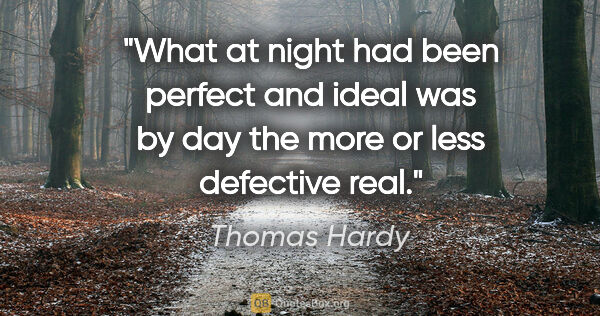More Or Less Quotes (page 8)
One third, more or less, of all the sorrow that the person I think I am must endure is unavoidable. It is the sorrow inherent in the human condition, the price we must pay for being sentient and self-conscious organisms, aspirants to liberation, but subject to the laws of nature and under orders to keep on marching, through irreversible time, through a world wholly indifferent to our well-being, toward decrepitude and the certainty of death. The remaining two thirds of all sorrow is...
Aldous Huxley
While people are fairly young and the musical composition of their lives is still in its opening bars, they can go about writing it together and sharing motifs (the way Tomas and Sabina exchanged the motif of the bowler hat), but if they meet when they are older, like Franz and Sabina, their musical compositions are more or less complete, and every motif, every object, every word means something different to each of them.
Milan Kundera
The childish and savage taste of men and women for new patterns keeps how many shaking and squinting through kaleidoscopes that they may discover the particular figure which this generation requires to-day. The manufacturers have learned that this taste is merely whimsical. Of two patterns which differ only by a few threads more or less of a particular color, the one will be sold readily, the other lie on the shelf, though it frequently happens that after the lapse of a season the latter...
Henry David Thoreau
Oh, if only I did nothing simply as a result of laziness. Lord, how I’d respect myself then. I’d respect myself precisely because at least I’d be capable of being lazy; at least I’d possess one more or less positive trait of which I could be certain. Question: who am I? Answer: a sluggard. Why, it would have been very pleasant to hear that said about oneself. It would mean that I’d been positively identified; it would mean that there was something to be said about me. “A sluggard!” Why,...
Fyodor Dostoevsky
Here's an example: someone says, "Master, please hand me the knife," and he hands them the knife, blade first. "Please give me the other end," he says. And the master replies, "What would you do with the other end?" This is answering an everyday matter in terms of the metaphysical. When the question is, "Master, what is the fundamental principle of Buddhism?" Then he replies, "There is enough breeze in this fan to keep me cool." That is answering the metaphysical in terms of the everyday, and...
Alan Watts
You start into it, inflamed by an idea, full of hope, full indeed of confidence. If you are properly modest, you will never write it at all, so there has to be one delicious moment when you have thought of something, know just how you are going to write it, rush for a pencil, and start buoyed up with exaltation. You then get into difficulties, don’t see your way out, and finally manage to accomplish more or less what you first meant to accomplish, though losing confidence all the time. Having...
Agatha Christie
In any case, his religious teaching consisted mostly in more or less vague ethical remarks, an obscure mixture of ideals of English gentlemanliness and his favorite notions of personal hygiene. Everybody knew that his class was liable to degenerate into a demonstration of some practical points about rowing, with Buggy sitting on the table and showing us how to pull an oar.
Thomas Merton
When they first emerged in their present shape around the turn of the 18th century, the so-called humane disciplines had a crucial social role. It was to foster and protect the kind of values for which a philistine social order had precious little time. The modern humanities and industrial capitalism were more or less twinned at birth. To preserve a set of values and ideas under siege, you needed among other things institutions known as universities set somewhat apart from everyday social...
Terry Eagleton
